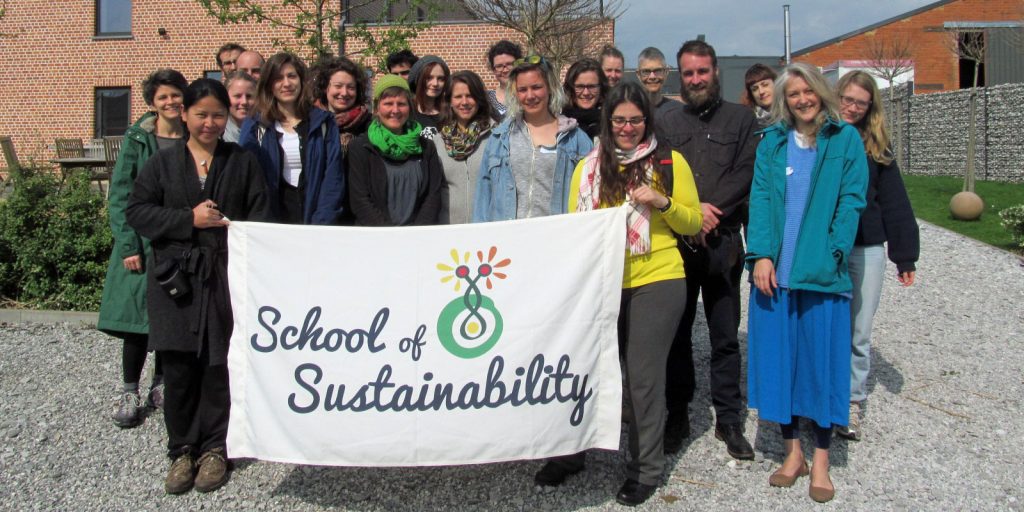Having recently participated in a training event organised by Friends of the Earth Europe’s School of Sustainability project, Laure Kervyn reflects on her experience and what the group learned about working with affected communities.
***
At the end of March, 20 participants from the Friends of the Earth Europe network gathered in the Walloon village of Denée for a 5-day training on how to work with affected communities. The training was organised by the School of Sustainability project and Training for Change, whose unique experiential approach creates learning environments that provide the practical tools and insights that we can use in our struggle for environmental and social justice, as well as opportunities for real growth, transformation, and empowerment.
We first met on Tuesday night, after a long journey for some of us. On the first night, we had the pleasure of discovering a concert-ference by Sebastien Meyer. After traveling for four years in Latin America, Sebastien Meyer is now developing a gesticulated conference [1] with Friends of the Earth Belgium to share his experiences. Through stories of the different communities he met and their songs of resistance (like Floriô Zé Pinto), Sebastien walked us through his travels in South America.
The training started the following morning, with a reflection on what ‘affected community’ actually means. This concept is often not clear for English speakers but is even more difficult to translate to the languages that were present in the room (more than 16 languages). Instead of trying to give it an academic definition, we separated in small groups to draw what ‘affected community’ means to us.
[[{“attributes”:{},”fields”:{}}]] [[{“attributes”:{},”fields”:{}}]]The multiplicity of examples reflected the diversity of experiences and realities within our own group – a diversity that had already been highlighted by Erika, one of our trainers, when she started the training with the diversity welcome. [2]
We then went on to one of the crucial questions of the training: how to work with affected communities with respect. As simple as this question might seem for anyone who fights for more social and environmental justice, it is far from being easy to actually live up to our good intentions. Conflicts arise more often than not and many of these have to do with power and privilege. The training therefore focused mainly on what Training for Change calls “Mainstream and Margins conflict”. Every group has a mainstream – or more – group as well as margins. The mainstream is the group whose ‘qualities, behaviours, and values’ are supported by the group. The mainstream sets the norm of the group, leaving those with other characteristics to the margins.
Mainstream and margins are fluid. Each role ‘can make moves to a resolution of conflict – integrating the margin into the mainstream through expanding what defines the mainstream’. Working with the dynamics of our own group for four days, the group had the opportunity to explore this concept of mainstream and margins, allowing us to realise that oppression is not static and that we can change oppressive patterns with more awareness when it leads to behaviour change.
This training brought a lot of questions for many of the participants; questions on the way we work, on our internal dynamics, on our structures. Questions of power and privilege within the federation and the groups. For some, the priority seems to be to focus on the internal changes we need in the groups and the federation before we can even start working with affected communities – a priority set by the question of our own blindness regarding our different power and privileges. For others, there is a concern about who is part of the organisation – are we really reflecting society with its multiple layers and demographics? And if we are indeed lacking diversity in our groups, are we able to identify the problems we are talking about – and those we are not talking about?
We might not find any definitive answers to these questions, but it is good to have the space to ask them. An opportunity that we hope more people from the Friends of the Earth federation will have. After all, ‘ally is a verb, not a noun‘. If we want to work with affected communities as allies, we will always have to ask ourselves what power and privilege we hold, we reproduce and we can change.
***
[1] The gesticulated conference is a kind of show, and above all a popular education tool. At the intersection between theater and academic conference, the gestured topic is mixing within one narrative the experience of the performers and the elements of theory. The aim is to give the keys to understanding society and develop a critical spirit. The gesticulated conference finds its full meaning when followed by a workshop for reflection and / or putting into action. This workshop allows to explore an issue more deeply with the spectators/ participants who want it. Ideally, the workshop lasts for half a day. [2] The tools shared in this blog are extremely helpful but can also be difficult to use properly. You might want to consider practicing before using it in your own workshops.





